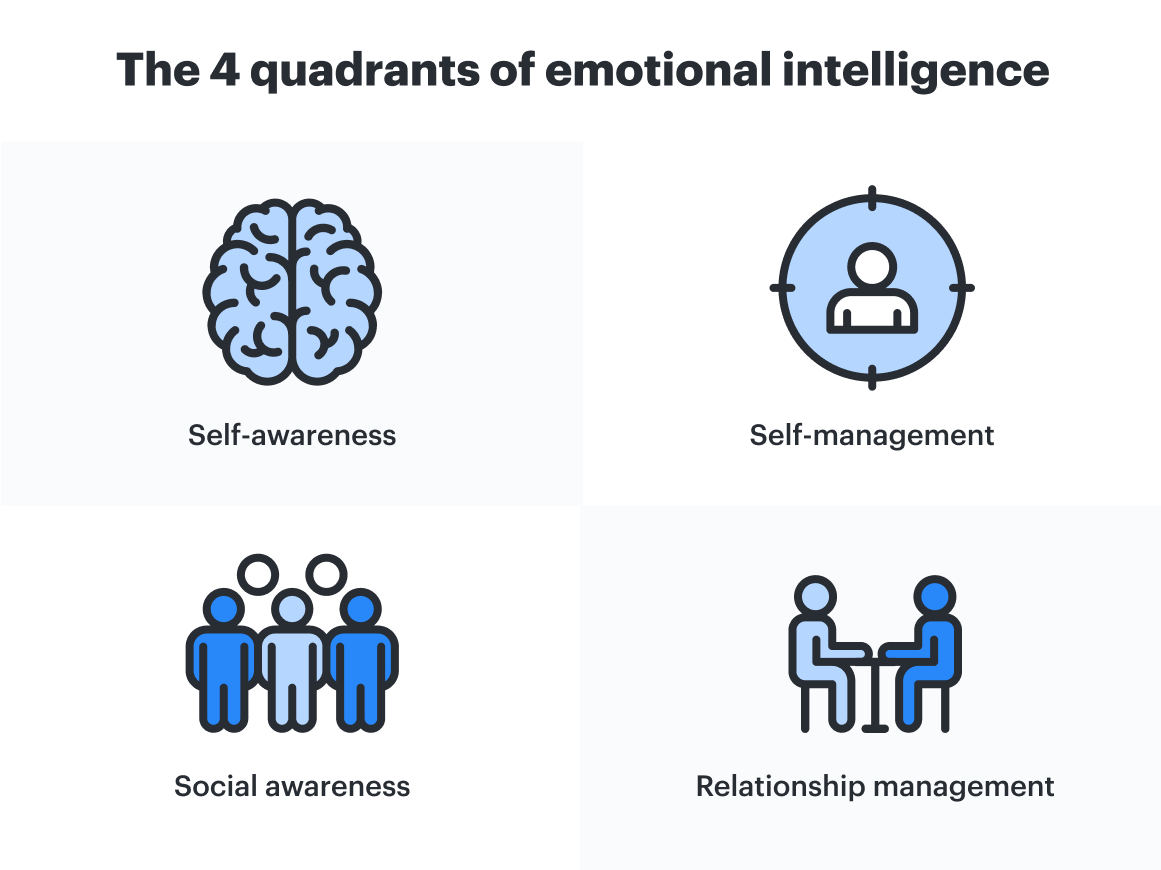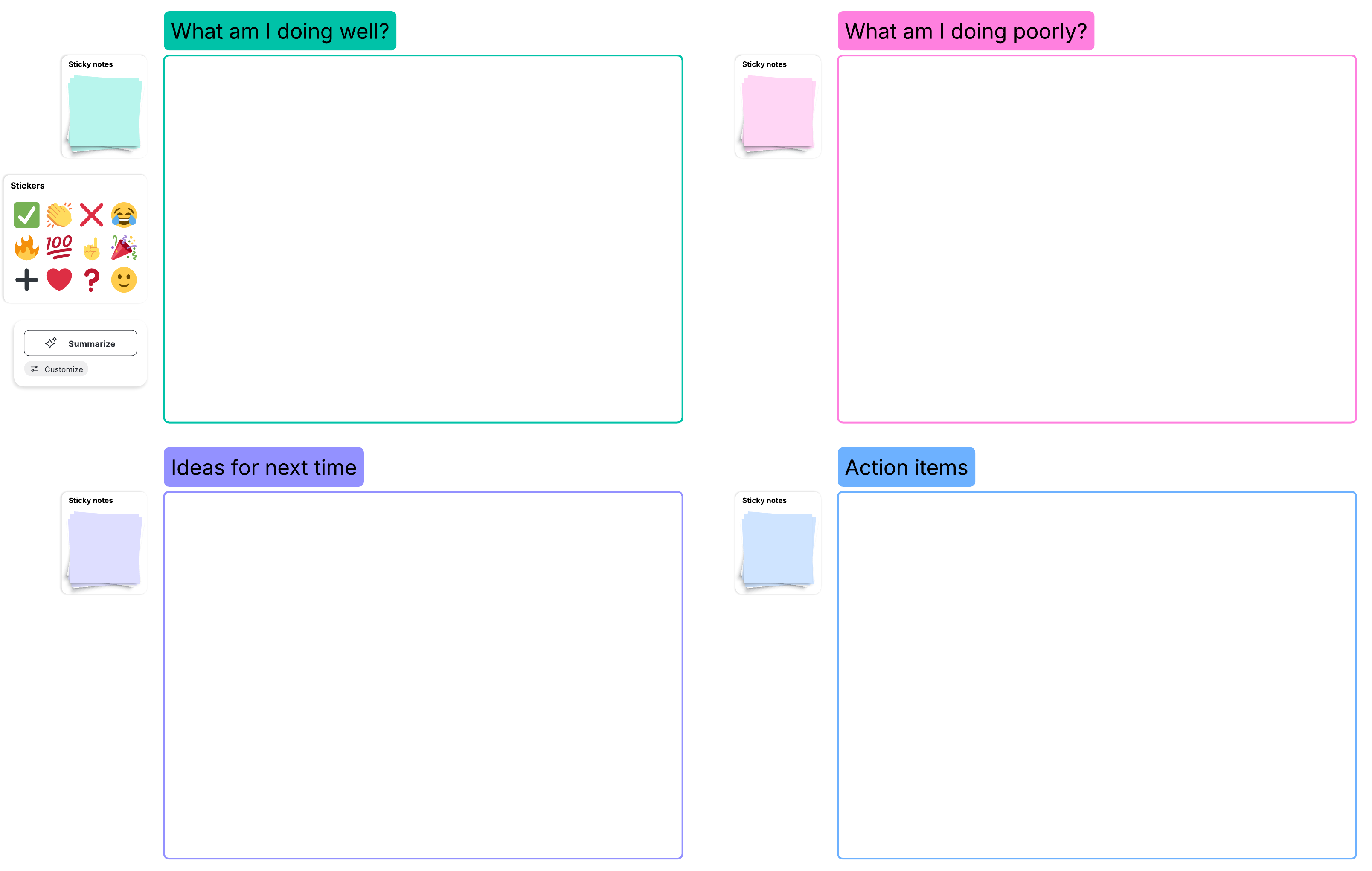
Why is emotional intelligence important in leadership? Understanding the 4 quadrants of emotional intelligence
Reading time: about 7 min
Topics:
In our increasingly uncertain, changing world, applying emotional intelligence to life situations gives us certainty. Emotional intelligence is key to developing resiliency and it allows people to adapt to setbacks, break from tired old thinking, find renewed purpose, or move forward on a bold course of action with confidence.
More importantly, the presence of emotional intelligence is often what inspires employees to rally around and trust their leaders. Practicing emotional intelligence acts like a beacon to others, letting them know who will look out for them, care about their best interests, and make their personal well-being and livelihood a priority.
Why is emotional intelligence crucial for effective leadership? For better or worse, emotions are contagious. When people reflect on how much they enjoyed (or despised) a job, they often interpret their experience not through the lens of what the actual work entailed on a daily basis or by a laundry list of perks, but by whether or not they enjoyed working with their manager.
This is where emotional intelligence can make or break the work dynamic. Before you can really begin to appreciate why emotional intelligence is important in the workplace, it helps to first understand what emotional intelligence is and what leaders can do to develop it.
Let’s get started.
What is emotional intelligence?
Emotional intelligence (sometimes called EI or EQ) can be described as your ability to identify, express, and manage your emotional reactions. EQ also involves your capacity to perceive, evaluate, and respond to emotions conveyed by others.
Another way of looking at emotional intelligence is “street smarts.” Having a knack for reading people and understanding their needs is an ideal complement to a high IQ or “book smarts.” On its own, not even the best college education is a guarantee of success.
It’s why some people thrive and go on to become effective leaders, motivational speakers, and business owners with only a high school diploma and why others flounder even with an MBA.
While there are those who seem born with the gift of emotional intelligence, with enough time and dedication, anyone can refine or further develop their emotional intelligence. This development starts by breaking down the different components that contribute to emotional intelligence.
The 4 quadrants of emotional intelligence and other EQ components
According to the model proposed by the internationally renowned psychologist Daniel Goleman first published in 1995, emotional intelligence is comprised of the following five abilities:
- Know your emotions
- Manage your emotions
- Motivate yourself
- Recognize and understand other people’s emotions
- Manage relationships (i.e., other people’s emotions)
There are also four quadrants detailing the internal and external areas of emotional intelligence:
- Self-awareness: The foundation of emotional intelligence is a keen awareness of how your actions influence others and how their actions also affect your emotional state.
- Self-management: An aspect of personal competence, self-management is about keeping control of your emotions, adapting to change, and persevering despite setbacks.
- Social awareness: An aspect of social competence, social awareness is about being an active and involved listener, showing empathy for others, and noticing changes in moods.
- Relationship management: Another aspect of social competence, this is your ability to express yourself, get along with people and manage their feelings in a sensitive manner.

Taken together, the four quadrants of emotional intelligence provide a constant balance between the internal and external factors that impact our lives. Once you get beyond the basic understanding of the strengths and limitations of your own emotional intelligence, you’ll have a firm foundation for how to self manage your emotional intelligence.
How to improve your emotional intelligence
Improving your emotional intelligence is not a quick fix but rather a journey that involves a great deal of honesty and personal reflection, especially when it comes to examining where you might fall short.
With greater emotional intelligence, you’ll begin to stand apart from those with otherwise similar backgrounds, education, and experience. For executive positions, possessing a keen grasp of emotional intelligence can make a world of difference in your ability to motivate your team and build a strong foundation of trust across your company.
As a leader, consider these emotional intelligence tips for improvement:
- Seek honest, constructive feedback from your employees as well as your peers.
- Cultivate an environment of psychological safety in which colleagues feel safe to share ideas, express concerns, and admit mistakes without fear of retribution.
- Communicate with more than just words: Use body language, gestures, and tone.
- Track the times when you feel overwhelmed by emotions or easily become upset.
- Motivate yourself and others by setting goals and facing challenges, big or small.
- Read stories about people in different circumstances to increase your empathy.
- Understand each of your team member’s collaboration styles and promote collaboration equity.
- Establish norms for how the team interacts with a team charter or working agreement.
- Start recognizing and appreciating those who exhibit emotional intelligence.

The 3 collaboration styles
Did you know there are different styles of collaboration? Learn about them to improve alignment on your team.
Check it outIn stressful situations, emotionally intelligent leaders always favor response over reaction. Attitude means everything. Don’t let negativity cloud your actions and behavior. By conveying a positive attitude, you become more approachable. This alone will go far in promoting an environment of psychological safety, transparency, and respect.
Getting everyone focused on a common goal of improving their collective emotional intelligence will enhance how your team communicates and resolves internal conflicts. Additionally, developing EQ gives team members the tools necessary to become more productive and proactive.
Given how introspective it can be to take stock of your emotional intelligence, where is the light at the end of the tunnel? What will it take to achieve real transformation?
How will I know if I’m making progress in developing the four quadrants of emotional intelligence?
Depending on your current level of emotional intelligence and self-awareness, it can take time to find your flow for developing your EQ. The good news is, not everything needs to be fixed all at once. Start by building on your strengths.
It’s easier to track your progress in a skill where you already exhibit some competency but room for improvement remains. So, if you’re already great at social awareness with team members, challenge yourself to interact with peers in other departments to expand your perspective and understanding.
Seeing gradual progress in the quadrants of emotional intelligence you already have competence in will give you the confidence to tackle bigger challenges.
Of course, pushing yourself to confront the areas of weakness in your emotional intelligence will be the most revealing. If addressing confrontation or asserting authority in times of crisis is an issue, become laser focused on how you manage your emotional response in those situations.
For a gut check on the progress you’re making to improve your personal emotional intelligence, solicit the honest, unfiltered opinions of direct reports, colleagues, and supervisors at work. This can be accomplished easily and anonymously by using an online 360-degree assessment tool. The feedback gathered through a 360-degree assessment often includes a self-evaluation as well.
Or, you can conduct a quick retrospective with your peers to gather feedback. By using Lucid, you can even turn on the private mode feature so any feedback provided is anonymous, ensuring that people feel free to be honest.

The importance of emotional intelligence in leadership
Emotional intelligence is crucial for leadership. Leaders who understand their own emotions and are able to recognize the emotions of others are better able to establish a work environment where positive relationships are fostered. When people feel seen and understood, they feel safe to express their ideas and are more motivated to make high-value contributions to their team.
There are many advantages of emotional intelligence in leadership, but the most immediate and fulfilling confirmation that your emotional intelligence is improving will be in the growing ease (and productivity) of the day-to-day communications between you and your team. To enhance collaboration and alignment with your team, develop your own emotional intelligence and encourage others to do the same.

Developing a high-performing team
Learn how to use your emotional intelligence and other leadership skills to build a high-performing team.
Get the guideAbout Lucid
Lucid Software is the leader in visual collaboration and work acceleration, helping teams see and build the future by turning ideas into reality. Its products include the Lucid Visual Collaboration Suite (Lucidchart and Lucidspark) and airfocus. The Lucid Visual Collaboration Suite, combined with powerful accelerators for business agility, cloud, and process transformation, empowers organizations to streamline work, foster alignment, and drive business transformation at scale. airfocus, an AI-powered product management and roadmapping platform, extends these capabilities by helping teams prioritize work, define product strategy, and align execution with business goals. The most used work acceleration platform by the Fortune 500, Lucid's solutions are trusted by more than 100 million users across enterprises worldwide, including Google, GE, and NBC Universal. Lucid partners with leaders such as Google, Atlassian, and Microsoft, and has received numerous awards for its products, growth, and workplace culture.
Related articles
How leaders can use conflict as a tool for growth and team performance
To find out how leaders can embrace conflict as a tool for growth, we talked to Samantha Denning, an executive coach and expert in mediation and conflict resolution.
3 ways leaders can use visuals as a catalyst for change
Agile leadership expert Pete Behrens shares insights on how leaders can use visuals to effectively lead their organizations through change.
Traditional vs. agile leadership, explained
In this blog post we will explain traditional leadership vs. agile leadership and share some tips for becoming a more agile leader.
How to create psychological safety at work: Strategies and steps for leaders
Learn how to build psychological safety at work with strategies and steps for leaders.
